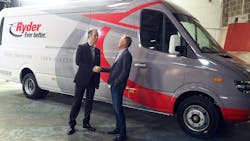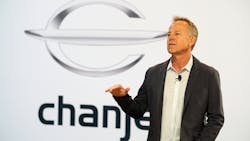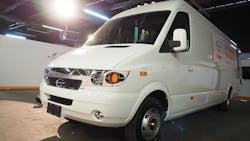With Ryder System, Inc. announcing it has begun taking delivery of its first 125 Chanje V8070 all-electric commercial panel vans, what's different about this Class 5 vehicle aimed squarely at last-mile, urban and metro-area delivery? Does it and other electric trucks have any real chance to take on the diesel-powered competition?
Bryan Hansel, CEO of Chanje, is the former CEO of Smith Electric Vehicles, a company that manufactured electric medium-duty commercial trucks targeting a similar market niche. Ultimately, Smith Electric faced an uphill battle and ceased production some four years ago at its Kansas City, MO plant.
But it turns out that quite a lot has changed since then, and there might actually be something to the recent stirrings in electric commercial trucks. There's certainly some very significant engineering, investment and strategy behind this new Chanje van and the potential adoption of electric delivery vehicles it could help foster.
So much so that Hansel believes fleets in last-mile delivery need to be looking at such electric trucks if they want to be competitive in the near future, with electric power offering a much lower cost per mile in the long run vs. diesel trucks. Reduced fuel costs, simplified maintenance, less driver fatigue and "green" corporate image all are advantages ascribed to electric trucks like the V8070.
Even in initial cost, Chanje's goal with this van is that this will be a purchase decision fleets can make simply based on whether the product meets their needs, and the electric trucks won't carry much of a premium over diesel trucks.
Still, the Chanje V8070 "is a premium product, and we are charging a premium for the truck," Hansel said. "So it is a little more expensive, but it's a fraction of what the difference was historically. And once you've paid for it, your per-mile savings are immense."
"Last-mile delivery is not going away," he added. "More and more stuff is coming to your doorstep. What I'm saying about last-mile delivery is, is there any chance that you can compete in 2025 on a per-mile basis and be operationally effective in the last-mile space if you're still driving a diesel truck?"
As far as driving the Chanje V8070, Fleet Owner got a chance to take the van through the streets of Brooklyn, NY's Williamsburg neighborhood (read more here). And for a Class 5 truck, we'll say in quick summary that we found the V8070 a relative blast and a cinch to operate, something Hansel encourages potential buyers to do.
"You get in the V8070 and drive it, and you'll be like, 'Okay, I get it,'" he quipped.
Volume-ready
So the product does appear to be quite capable, with its estimated 100-mi. range, 580 cu. ft. of cargo space and 6,000 lbs. of payload. But what's really different about this electric medium-duty van launch and now rental/lease availability through Ryder is that the V8070 has been set up to scale in many ways to meet large market needs.
The cost of electric vehicle technology, especially batteries, has come down significantly over the last several years, Hansel explained. The V8070 was designed from the ground up as an electric vehicle, and Chanje's manufacturing partner, FDG Electric Vehicle Limited, has about 100,000-unit production capacity at its Hangzhou, China plant where the van will be made.
The vehicle will be produced and shipped "knocked down" in containers to the U.S. and other markets globally, and it will be assembled locally in those markets. Chanje has been reviewing sites for a U.S. assembly facility and plans to make an announcement soon in that regard.
Thanks to Ryder, though, Chanje vans now have an extensive sales and service network. Ryder already has 12 locations and will soon have 16 in California, New York and Illinois set up to charge and service the V8070s, with technicians even ready to provide a preventive maintenance program, explained Chris Nordh, senior director of advanced vehicle technology and global fuel products at Ryder.
Ryder's first foray into alt fuel vehicles was in natural gas trucks, he said, which required perhaps a $500,000 investment for locations to be able to service the vehicles. It's much less expensive and quicker to get a location ready for electric vehicles like the Chanje V8070, he pointed out, adding that meanwhile, Ryder techs have "crawled all over" the V8070 to learn about its construction and maintenance.
Getting parts will also be a simple matter thanks to Ryder's distribution capabilities, Hansel noted. "Now we have parts distribution, and we haven't had that before," he said. "Now you know that if your driver clips a mirror on the V8070, you can go online and the next morning have a FedEx box at your door with a new mirror in it."
Investment
So the Chanje V8070 can be produced in volume more cost-effectively than other vehicles of its kind could even in the recent past, and the sales and service/support network is there as well. But to get to this point, it took huge investment that wasn't there before for companies like Smith Electric.
"We're ready to go, but that's a billion dollars later," Hansel said. "It's a billion dollars to have gotten that truck so I could hand the keys to Ryder today -- that's the investment that needed to be made."
Chanje is also looking to sell the V8070 holistically as a "turnkey solution," noted Suresh Jayanthi, vice president of energy services. The company will work with a fleet, for example, to assess energy infrastructure and is looking to provide charging equipment and everything needed to get V8070s -- and lots of them, if that's what's called for -- running deliveries from and returning each day to a depot.
Hansel said this whole construct and approach means that fleets can look at electric power now as a real strategy if the V8070 meets their needs. More Chanje vehicle variants based on the V8070 platform are coming and should be announced early next year, including a truck version and passenger shuttle van.
"Before, the idea of electrification was interesting, but fleets couldn't adopt it as a strategy because there was no supply," Hansel told Fleet Owner. "Now all of a sudden, you have a product that is very significant quality-wise, but if someone wants to buy 1,000 of them, we can actually build them and ship them to you.
"Now you can starting looking out over a 3-5 year plan and say, 'How do I make this transition in earnest?'" he continued. "The supply [of the vans] is there and when you add in Ryder, the support is there. It's guaranteed uptime, and that's what fleets really care about."
Indeed, Ryder is casting a vote of confidence in electric commercial trucks through several recent moves. In addition to the sales and service network agreement with Chanje, Ryder announced similar arrangements with Workhorse Group and Nikola, makers of medium-duty and heavy-duty electric commercial vehicles, respectively.
"If I can operate at a fraction of the per-mile cost, I can give my drivers a better experience, it's safer, and it's more efficient, that's disruption," Hansel contended. "When you have a better product, it's inevitable for it to make the transition" to mainstream adoption.
So what would success for Chanje, the V8070 and other models to come look like in a year?
"By the end of 2018, it would be a success for me if a broader base of fleet operators looked at it and said, 'Electrification is definitely the next step,'" said Hansel. "It could happen really fast, or it could take a while. But I want to change the conversation to where it's not about 'if' electrification becomes real in this space, it's just 'when.'"
About the Author
Aaron Marsh
Aaron Marsh is a former senior editor of FleetOwner, who wrote for the publication from 2015 to 2019.


